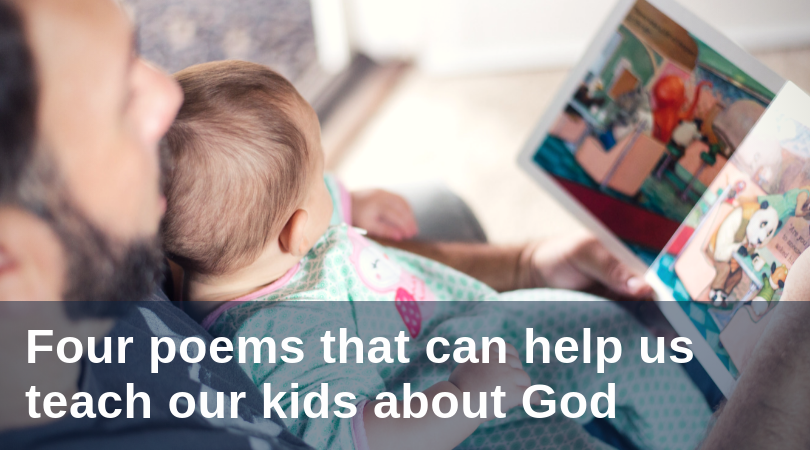
During my daughter’s early weeks of life, I started to read her poetry as I fed her. I’d like to say it was because I knew she found the sound of my voice soothing, or because I hoped to instill in her a love of literature from an early age or because I believe that vocabulary formation begins in these first, tender weeks. These things may all be true, but that’s not why I fill her sweet little ears with metered verse. No, I read her poetry to pass the time.
Don’t get me wrong; I love feeding my daughter. I love the weight of her in my arms, and how she looks up into my eyes, and I even love the sound of her tiny yet powerful burps. But despite these small delights, it does get a tad bit boring sometimes, and reading poetry to her makes the feeding experience all the more enjoyable for me.
That being said, as I’ve read her poem after poem, I’ve often found myself marking a page or jotting down a title and thinking, I’ll have to read this one to her again once she’s older and can understand it. Sometimes this is because the poem is funny or entertaining, but usually it’s because the poem contains a message that I want her to hear and know. Frequently, these messages are about faith or God, with the poem expressing a concept I believe to be true but can’t articulate quite so convincingly myself. In other words, these mealtime poetry readings have revealed to me what a powerful pedagogical tool poems can be.
Here are a few of my favorite poems and the messages they convey:
i thank You God, by e e cummings
This poem exudes wonder and awe at the created universe: “the leaping greenly spirits of trees,” the “blue true dream of sky,” and “everything which is natural which is infinite which is yes.” By beginning with the phrase “i thank You God,” it reminds us that “amazing days” are gifts from God to be treasured and praised.
Praying, by Mary Oliver
With this poem, Mary Oliver teaches us both what prayer is (“a silence in which another voice may speak”) and how to pray (“just pay attention, then patch a few words together”). The poem is short (a mere fifty-five words) and simple (three stanzas of unrhymed, unmetered verse), reminding us with its very tone and essence how uncomplicated and easy praying can be. You just have to do it.
God’s Dream, by Desmond Tutu and Douglas Carlton Abrams
I’m cheating a little bit here, because “God’s Dream” is a children’s book rather than a poem, but it’s very poetic, brimming with wisdom and one of my favorite “feed reads.” With gentle cadence, Tutu and Abrams paint a portrait of a God who loves us deeply and desires that we love our neighbors deeply. They remind us of the central message of Catholic social teaching, that all humans have dignity and that we are all a part of the same human family. “God dreams that every one of us will see that we are all brothers and sisters—yes, even you and me—even if we have different mommies and daddies or live in different faraway lands. Even if we speak different languages or have different ways of talking to God. Even if we have different eyes or different skin.”
Pied Beauty, by Gerard Manley Hopkins, S.J.
This poem might require a vocabulary lesson if you’re reading it to a child, but with that lesson will come a reminder of God’s radical love and miraculous creativity. Hopkins begins the poem with words of praise—“Glory be to God for dappled things”—and then goes on to list various examples of dappled things: “skies of couple-colour,” “rose-moles…upon trout” and a “brinded cow.” With its detailed images, the poem calls its readers to remember that all of creation comes from God—even the “counter, original, spare, strange” things—and to praise God for these marvels of creation, including us. Our unique and different qualities are God-given as well and a reason for joy.
Poetry has the potential to convey deep ideas and valuable lessons with just a few words beautifully strung together. Sharing poems with our children is a practice that can help them—and us—grow in faith and understanding of God.
Like what you read? Submit your email below to have our newest blogs delivered directly to your inbox each week.


